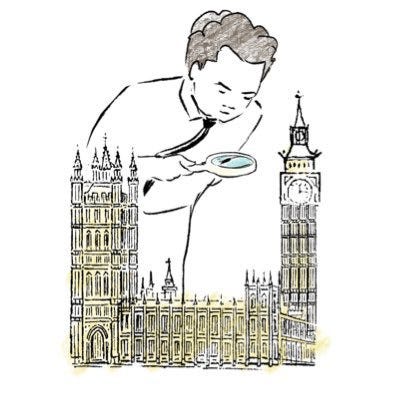Alleged spy charges announced, Defence changes, Foreign Secretary in the Stans
All the latest Westminster happenings
Hello,
On Monday, the Crown Prosecution Services announced it would be bringing charges against two individuals - Christopher Cash and Christopher Berry - under the Espionage Act for providing prejudicial information to a foreign state, China. The CPS press release stated “Criminal proceedings against the defendants are active. No-one should report, comment or share information online which could in any way prejudice their right to a fair trial." The media has therefore limited its coverage, as will we; for those seeking more detail, The Times has the most comprehensive coverage.
Away from that drama, Britain’s Foreign Secretary Lord Cameron visited Tajikistan, Kyrgyzstan, Uzbekistan, Turkmenistan, Kazakhstan and Mongolia. This might not have grabbed the attention of Westminster, but it marked a fairly critical test for British diplomacy and has been received well in the region: one Uzbekistan MP tweeted it was an “immense honour” to meet the “legendary Lord Cameron”. As I noted last year, trade with Uzbekistan increased dramatically after the Russian invasion of Ukraine - with notable exports including machinery which could be dual use. This was consequently raised throughout Cameron’s talks in the region, alongside more positive discussions around trade and cultural engagement.
But to focus just on the negatives would be to miss the point in what was a momentous moment for British foreign policy post-Brexit. This was a chance for the United Kingdom to show what it has to offer - and, critically, to make the case for why countries should care. As Cameron summarised in his video: “This is what being competitive and out there in a contested world is all about."
I think it’s worth unpacking the Mongolia trip. Readers may recall that we were the first to note the importance of the uptick in UK-Mongolia diplomacy and engagement last summer and to suggest economic activity was to follow. Cameron’s trip coincided with movement around a new UK-Mongolia air bridge being opened, which would specifically focus on critical minerals. Worth watching very closely indeed.
- Sam Hogg, Editor
What you’ll learn in this briefing note
What the Minister for the Indo-Pacific has been up to in China
Who was talking about lithium in Parliament
What the Government has in stock for British universities on China
Diplomacy Tracker
Politics
On the global stage, Prime Minister Rishi Sunak announced new funding for Ukraine, and an increase in the UK’s defence budget to 2.5% of GDP by 2030, which (per Government maths) equates to around £75bn. Unsurprisingly, the announcement - in his words, “a turning point” - was overshadowed by policy wonks who crunched the numbers and cut through the noise. They found “It's only a "£75 billion increase" over 6 years if you assume that spending would otherwise have been frozen in cash terms for 6 years - i.e. only if the government was, until today, planning to breach its NATO commitments.”
Writing in The Telegraph, the UK’s Chief of the Defence Staff of the British Armed Forces, Admiral Sir Tony Radakin, observed that “the world has moved from being competitive to contested and is now openly combative.” To this end, he concluded “What we have seen unfold in the past few years is a battle of ideas: between an authoritarian and belligerent Russia and a dynamic, democratic Ukraine; between a reckless Iran and its terrorist network on one side, and the responsible nations of the Middle East on the other; between a China that believes it can dominate and coerce, and those nations that share a commitment to an international system that is open and free. So let’s have the confidence to recognise this moment for what it is: a sign of our self-assuredness; an investment that sends a message to friend and foe alike. Britain has lost none of her famous resolve. We will defend our interests. We will support our allies. And together we will prevail.”
Also in a similar mood was former Defence Secretary Ben Wallace, who said in his Telegraph article that Sunak’s defence pledge showed he was the right man at the right time, and that “The Prime Minister is right that there is an axis of authoritarian states that is determined to challenge the rules of the global road. We can see that in Putin’s attempt to change borders by force, China’s activities in the South China Sea, and Iran’s efforts to destabilise the Middle East and disrupt global commerce. So, we must commit the resources we need to deter these threats and stand up for our values. This increase in our defence budget is the best step Britain can take to prevent future conflict.”
Labour will be pleased by the Government’s manoeuvres. Readers may recall that a short while ago, Shadow Defence Secretary John Healey called for some changes at the Ministry of Defence should his party win power, some of which appear to have been considered in this latest Government announcement.
Elsewhere on the defence beat, Gwyn Jenkins, one of the country's top generals, was appointed as the UK’s next National Security Adviser. His appointment followed reporting that current National Security Adviser Tim Barrow would be appointed as Britain's next ambassador to the United States - a move that has likely annoyed Labour, who will have been wanting to put their own person in post should they win the next election.
Finally, here’s something that was missed by the media but is worth noting very acutely indeed. “Here are the warnings and indicators of a nation getting ready for war. The evidence fits historical patterns. I am no longer in any doubt.” So tweeted Dr Rob Johnson, the head of Government unit SONAC (which gives independent advice to the Secretary of State for Defence, Grant Shapps.) That makes this one of the highest-level views that war is inevitable we’ve seen publicly from the UK’s Whitehall machinery to date.




